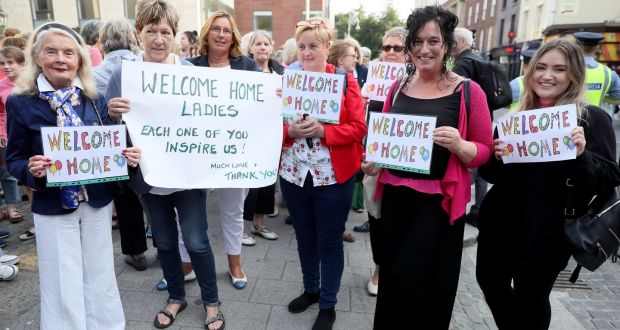
This week, I did some more concentrated wandering into another piece of Ireland’s complicated history. I toured the Magdalene Laundries with the survivors. I really recommend clicking on the link to the article if you have time. It contains interviews and stories of Laundry survivors.
In Joyce’s “Clay” we meet Maria, a woman who works in a laundry. She is only employed by the laundry though, which means that she gets permission to go out. This is an interesting dynamic given that the laundries were often cruel places to be for women and children that were brought in. Women in Magdalene Laundries were often abused and were definitely used as slaves. The women who qualified for such treatment were unwed mothers, prostitutes, women who had sex outside of marriage, or other female undesirables. They were often put on bread and water diets. They had to endure having their heads shaved, floggings, isolation, enforced silence, and close surveillance of visitations and correspondence. According to the interviews in the article above, the children in the care of the laundries did not fare much better than the women sent into them for rehabilitation.
The laundries operated until the late 20th century, with the last one closing in 1996. The discovery of a mass grave of 155 unnamed and unknown women prompted the closures, as stories of abuse were exposed. The fallout was immense; however, the Irish Government did not acknowledge its complicity in the running of these laundries until 2013 when it issued an apology.
The article and the interview made me tear up a little though. The patriarchal nature of Ireland’s religious community made it very hard for these women to have the crimes against them acknowledged. Most of the women in these institutions committed no crime other than to have indulged in something that religion frowned upon or even something as small as being considered burdens on their families.
In “Clay” we don’t hear about these atrocities because they were committed behind closed doors. We know that women were often not allowed out, presumably to facilitate rehabilitation, but mostly because they were working for “their keep”. Maria may not feel privileged as a woman faced with poverty and no prospect of marriage, but just by being allowed out of the laundry is a sign of the privilege that she has as a free woman and not an inmate.


Hi Demetria, it is really shocking how long that was able to go on for. I am surprised that it could continue to operate for so long, did they attempt to change their image in order to facilitate their existence in modern times? Your notice of the shame and blame that was used as a means of imprisoning women stands out to me. Outside of these laundries, I bet that the larger urban space was equally unwelcoming and as a result women felt trapped to stay within their confines as an evil that they atleast knew. While Joyce as you mentioned does not explicitly document the horrors in these laundries, I feel that in some of his stories such as in Eveline and in The Boarding House, that the reader somewhat grasps the feelings of suffocation and paralysis of autonomy that these women experienced. What were your feelings when reading these stories (including Clay), taking into account Joyce as a man was trying to inhabit a female voice and mind when writing them. Do you think he fell short, if so, how?
Demetria,
What a thoughtful post. The atrocities mankind can commit never cease to amaze me. I can’t believe this went on for so long and ended not that long ago. It’s easy to see why there are so many authors, artists, and activists that are/were vocal against what religion/religious institutions are doing to people. Thank you so much for sharing this. I think you made an important point about privilege. I think it’s imperative to reflect on all the ways that we have advantages and freedom, even if it seems like our situation is terrible (which it could be as well. I don’t want to minimize anyone’s struggles). I’m glad that these women finally got to voice what they went through and also have a voice for the women who weren’t able to. I hope that it can perpetuate change for other oppressed and abused people.
This is such an insightful post and really adds a layer of meaning to the stories in Dubliners. I think it also shows the value and importance of authors like Joyce writing about seemingly commonplace and unexciting everyday things, but actually have such a big role in bringing out the history, even if it is not directly.